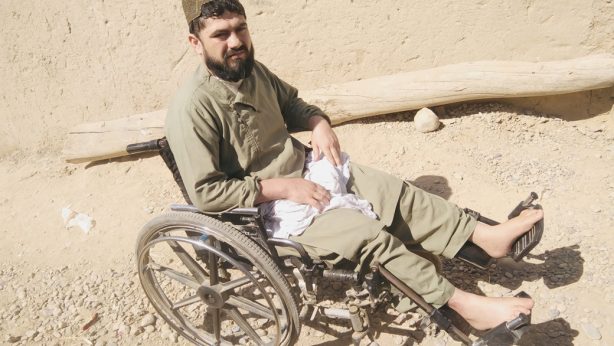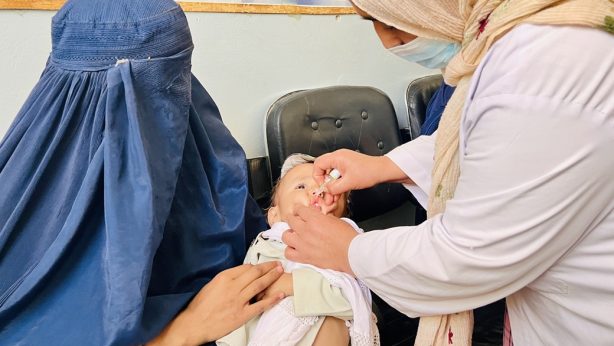Door to door…

Imagine not having electricity.
Or education.
Or sharing a precarious water supply with the community.
Imagine you can’t go to hospital because it’s too difficult to get there.
The community of semi-nomads – known as Kuchi — living on the outskirts of Kandahar, in southern Afghanistan, don’t need to imagine. They live this reality every day.
But against this challenging backdrop of deprivation, they do have something.
They have resilience.
They have hope.
And they believe in the power of two drops of polio vaccine to keep their children safe.
Two-year-old Mohamad Ali lives with his parents, two sisters and three brothers. They are one of nearly 1000 semi-nomadic families who have settled in the Shurandam neighborhood of Kandahar city. They keep sheep and goats and produce meat and dairy in exchange for other food or products.
The Kuchi live in synch with the rhythm of the day. Sunrise provides light by which to work; sunset signals the time to rest. In between, cooking is done by log fire; livestock are tended to; water is fetched from the one water well that is shared between 15 families. No children go to school; there isn’t one to go to. And healthcare services are also challenging with the nearest hospital located three kilometers away across the highway – a formidable road with no pedestrian crossings.

2-year-old Mohamad Ali received two drops of polio vaccine in Kandahar, South region of Afghanistan. In 2020, UNICEF received a Comic Relief grant for procurement of polio vaccines to immunize and protect children in Afghanistan from paralyses caused by the polio virus. Afghanistan continues to report polio cases, with the majority of them registered in the South region.
Today, during the national immunization campaign, the polio vaccination team visits Mohamad Ali’s family to give him and two thousand other children under the age of five the polio vaccine. In many cases, the polio vaccination is the only health intervention children in this community receive. While the vaccinator delivers the drops, the social mobiliser talks to Mohamad Ali’s mother about the health of her children and explains the necessity of receiving all routine immunization services.
The Government of Afghanistan, UNICEF and WHO are working hard to make sure that every child is immunized and protected from polio. Vaccination teams visit every house during the three days of each polio campaign. To ensure effective communication with the communities, UNICEF supports the work of social mobilisers, who work with vaccinators to talk with the families to reassure them, raise awareness of the importance of vaccines, and address myths round vaccination. For example, they explain the vaccine is halal for Muslims and is a safe way to protect children from paralysis. Social mobilisers carry a register with the names, ages, and vaccination records of all children living in the area, to make sure every child is immunized and protected.
“People came to our houses with a loudspeaker and explained that the vaccine would protect our children from diseases. If we don’t vaccinate, children can be affected by polio and can be paralyzed,” says Baran Bibi, Mohammed Ali’s 29-year-old mother. “Three of my children died; now I have four sons and two daughters. The youngest one, Hajira, was born only two weeks ago. I hope all my children will grow up healthy. It is difficult for me to go to the clinic, so I am happy that vaccinators came to my home and gave my children the polio vaccine here.”
Afghanistan remains one of the two countries in the world that are polio-endemic. The southern region is the epicenter of the polio virus type 1. In 2020, 38 out of the total 56 cases in the country were registered in the South. Moreover, the region currently faces an outbreak of polio virus type 2 with 314 cases reported in the country last year.
Polio spreads in the areas where children have low immunity. To eradicate the virus, UNICEF, with the support of donors, is working to vaccinate all children under the age of five. In 2020, UNICEF received a Comic Relief grant for procurement of high-quality polio vaccines with a proper cold chain, including vaccine carriers with an ice pack for the vaccinators, to immunize and protect children in Afghanistan from being paralyzed for life.


